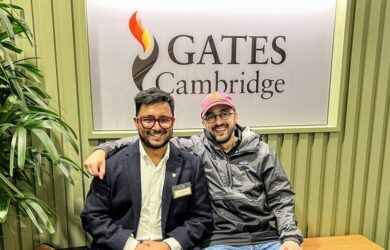Niraj Lal will talk on radio about his children's story about Chaos Theory.
A Gates scholar will be talking about a short story he wrote for children about Chaos Theory on the radio this weekend.
Niraj Lal (2008) will be speaking on the “Science in Fiction” show on CamFM radio at 6pm on Sunday.
The show is hosted by Dr Andy Holding and will discuss all things related to Chaos Theory and the weather.
Niraj’s short story is called “Butterfly Flo and the Everything Effect”. It is about a butterfly in the Australian bush who learns about the butterfly effect of Chaos Theory.
Niraj will also be taking part in a Widening Participation event for young people (11-18) in care and foster homes on 26th October. He will be talking about “The Science of Electricity”.
Since arriving at Cambridge, Niraj, who is studying for a PhD in Physics at the Nanophotonics Centre, has been involved in a whole range of outreach work with children and adults, explaining the work he does researching solar cells and panels. Niraj has also recently scooped a research award at an international conference on photonics in South Korea.
He was the only PhD student invited to present at the 5th International Conference for Surface Plasmon Photonics, held in Busan, South Korea and was awarded the Conference’s Students Research Prize of 520,000 Korean Won (about £285).
It was the second conference Niraj has been invited to – in 2010 he gave an invited presentation at the Optics Society of America Congress, held in Karlsruhe, Germany. Nij’s presentation was titled “Enhancing solar cells with localised plasmons in nanovoids” – describing why his organic plasmonic solar are ‘orgasmonic’ – giving four times more efficiency than similar flat solar cells. The results were recently published in the Optics Society of America journal Optics Express.












